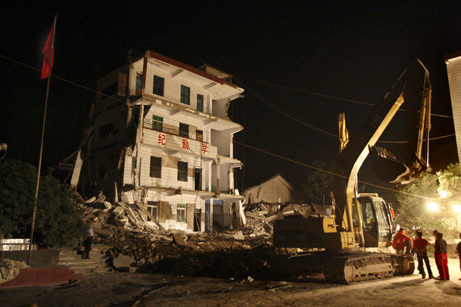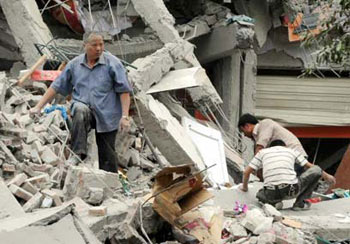You are hereFigures & Facts
Figures & Facts
Nearly One Third of World's Species Extinct Since 1970
Original Source: BBC News
(quote)
Between a quarter and a third of the world's wildlife has been lost since 1970, according to data compiled by the Zoological Society of London. Populations of land-based species fell by 25%, marine by 28% and freshwater by 29%. Humans are wiping out about 1% of all other species every year, and one of the "great extinction episodes" in the Earth's history is under way, it says. Pollution, farming and urban expansion, over-fishing and hunting are blamed.
The Living Planet Index, compiled by the society in partnership with the wildlife group WWF, tracks the fortunes of more than 1,400 species of fish, amphibians, reptiles, birds and mammals, using scientific publications and online databases. It said numbers had declined by 27% in the 35 years from 1970 to 2005. Some of the worst hit are marine species which saw their numbers plummet by 28% in just 10 years, between 1995 and 2005. Populations of ocean birds have fallen by 30% since the mid 1990s, while land-based populations have dropped by 25%.
The WWF said that over the next 30 years, climate change was also expected to become a significant threat to species. Director general James Leape said: "Reduced biodiversity means millions of people face a future where food supplies are more vulnerable to pests and disease and where water is in irregular or short supply. "No-one can escape the impact of biodiversity loss because reduced global diversity translates quite clearly into fewer new medicines, greater vulnerability to natural disasters and greater effects from global warming."
The WWF is calling on governments meeting in Bonn to honour their commitments to put in place effective protected areas for wildlife and to adopt a target to achieve net annual zero deforestation by 2020. The UK's Biodiversity Minister, Joan Ruddock, said the report showed that the international community had to work together to stem the decline. "The fact that human activities have caused more rapid changes in biodiversity in the last 50 years than at any other time in human history should concern us all," she said. "Supporting wildlife is critical to all our futures."
(unquote)
Images courtesy of BBC News and WWF





Verizon Wireless joins LiMo Foundation, chooses Linux over Android for mobile platform
Original Source: Ars Technica
"Mobile carrier Verizon Wireless has joined the Linux Mobile (LiMo) Foundation and has announced plans to adopt the open source software platform. Linux-based phones will be available from Verizon next year, alongside other devices that run competing proprietary operating systems.
The LiMo Foundation is an industry group that was founded by leading handset makers. Their goal is to collaboratively develop a comprehensive Linux-based mobile software stack that can be modified easily and used at no cost on a wide range of hardware devices. Key members include Motorola, NEC, NTT DoCoMo, Panasonic, Samsung, and LG.
Verizon's adoption of Linux sends a clear message about the viability of the open source operating system in the mobile space. Carriers and handset makers seem to recognize that open source software provides them with better value and more flexibility than proprietary alternatives."


Polar Bear Declared Endangered Species
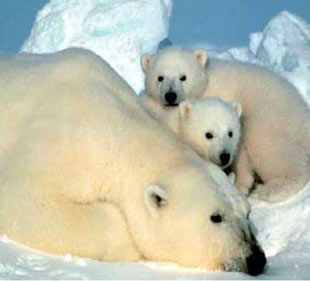

(quote)
The U.S. Department of the Interior Wednesday listed the polar bear as a threatened species under the Endangered Species Act (ESA) of 1973 based on evidence that the animal's sea ice habitat is shrinking and is likely to continue to do so over the next several decades. Interior Secretary Dirk Kempthorne, however, made clear several times during a press conference announcing the department's decision that, despite his acknowledgement that the polar bear's sea ice habitat is melting due to global warming, the ESA will not be used as a tool for trying to regulate the greenhouse gas emissions blamed for creating climate change.
The decision was based on evidence that sea ice is vital for polar bear survival, that this sea ice habitat has been reduced, and that this process is likely to continue; if something is not done to change this situation, the polar bear will be extinct within 45 years, Kempthorne said. He pointed to computer models he and his colleagues studied that project a 30 percent decline in sea ice by 2050. read more »
Air Pollution Increases Risk of Blood Clots
Original Source: BBC News
"Exposure to small particulates - tiny chemicals caused by burning fossil fuels - is known to increase the chances of heart disease and stroke. But the Harvard School of Public Health found it also affected development of deep vein thrombosis - blood clots in the legs - in a study of 2,000 people.
Researchers said the pollution made the blood more sticky and likely to clot. The team looked at people living in Italy - nearly 900 of whom developed DVT. Blood clots which form in the legs can travel to the lungs, where they can become lodged, triggering a potentially fatal pulmonary embolism."
Images courtesy of eNews 2.0 and Ontario Now
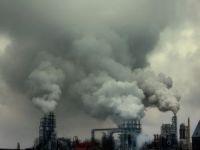

Ron Paul Supporters Organize GOP Convention Showdown Against McCain
Original Source: Los Angeles Times
(quote)
Quietly, largely under the radar of most people, the forces of Rep. Ron Paul have been organizing across the country to stage a public revolt against Sen. John McCain when Republicans gather for their national convention in Minnesota at the beginning of September.
In the last three months, Paul's forces, who donated $34.5 million to his White House effort and upward of a million total votes, have, as The Ticket has noted, been fighting a series of guerrilla battles with party establishment officials at county and state conventions from Washington and Missouri to Maine and Mississippi. Their goal: to take control of local committees, boost their delegate totals and influence platform debates.
...
Paul, for instance, favors a drastically reduced federal government, abolishing the Federal Reserve, ending the Iraq war immediately and withdrawing U.S. troops from abroad.
Paul’s supporters hope to demonstrate their disagreements with McCain vocally at the convention through platform fights and an attempt to get Paul a prominent speaking slot. Paul, who's running unopposed in his home Texas district for an 11th House term, still has some $5 million in war funds and has instructed his followers that their struggle is not about a single election, but a long-term revolution for control of the Republican Party. Paul's supporters have driven his new book, "The Revolution: A Manifesto," to the top of several bestseller lists.
(unquote)
Photos courtesy of AP and RonPaul.com

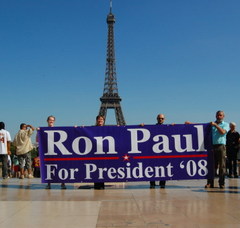
8 Ideas to Fix the Global Food Crisis
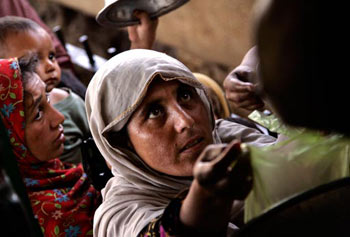
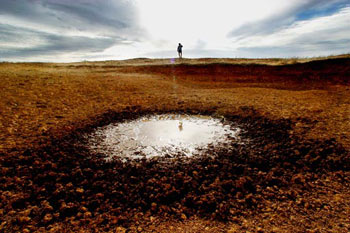
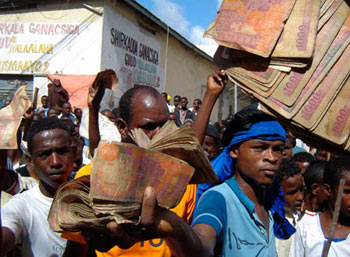
(quote)
The world food crisis has two faces. Here in the United States, shoppers stare in disbelief at the rising price of milk, meat, and eggs. But elsewhere on the globe, anguish spills into the streets, as in Somalia last week when tens of thousands of rioters converged on the capital to protest for food.
The strain on U.S. consumers, grappling with the sharpest increase in grocery prices in years, is small compared with the starvation that toppled Haiti's government, ignited riots around the world, and is deepening the tragedy of Myanmar's cyclone survivors. And yet the connection between the developed and developing worlds will be crucial to solving what one United Nations official has called a "silent tsunami" of food prices that has plunged 100 million people deeper into poverty. To stem the misery, relief officials are calling both for emergency aid and for changes in policy worldwide.
...Among the proposed solutions: read more »
- Take a Pause on Biofuels
- Improve Food Aid
- Produce Higher Yields
- Grow Better Crops
- Curb the Speculators
- Break Down Trade Barriers
- Eat Less Meat
China's Worst Earthquake in 30 Years - Death Toll 9000 and Rising
Original Source: The Standard
"The death toll from the massive earthquake that struck central China yesterday killing at least 8,533 people in Sichuan alone is likely to rise sharply as rescuers face a desperate race against time to save victims, including nearly 900 students buried under the rubble of their school. In Beichuan county, just east of the epicenter, 80 percent of the buildings had collapsed and some 10,000 people were injured on top of the 3,000 to 5,000 killed in the district, Xinhua News said. The situation in at least two other counties remains unclear.
The 7.8-magnitude earthquake, the most devastating in three decades, struck in the middle of the afternoon when classrooms and office towers were full 92 kilometers northwest of Sichuans capital Chengdu. Eight schools in the region completely or partially collapsed. The quake emptied office buildings more than 1,500 kilometers away in Beijing; could be felt as far away as Vietnam; crashed telephone networks; and hours later, left parts of Chengdu, a city of 10 million, in darkness. Beijing mobilized more than 5,000 soldiers and police to help rescue efforts in Sichuan and put the province on the second-highest level of emergency footing.
The earthquake rattled buildings in Beijing 1,500 kilometers to the north. People ran screaming into the streets in other cities, where many residents said they had never felt an earthquake. In Shanghai, skyscrapers swayed and office occupants went rushing into the streets. In Beijing, where hundreds of thousands of visitors are expected for the Olympics, which start on August 8, venues for the Games were undamaged.
The quake appears to be the deadliest since the most devastating in modern history, which killed 240,000 people in the city of Tangshan in 1976."
Photos courtesy of Reuters and AFP
